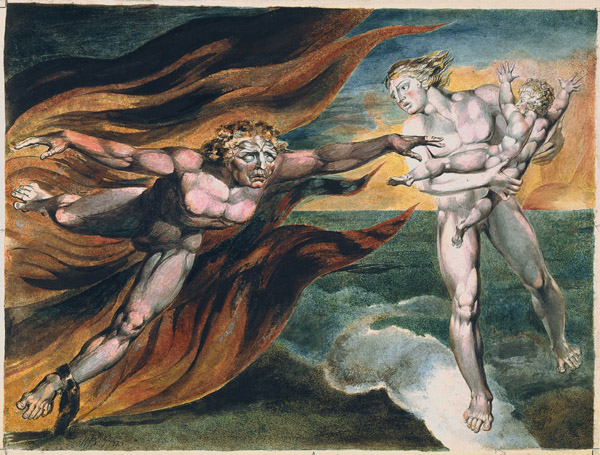Genesis 2
[9] And out of the ground the LORD God made to grow every
tree that is pleasant to the sight and good for food, the tree of
life also in the midst of the garden, and the tree of the knowledge
of good and evil.
[16] And the LORD God commanded the man, saying, "You may
freely eat of every tree of the garden;
[17] but of the tree of the knowledge of good and evil you
shall not eat, for in the day that you eat of it you shall die."
The drama which took place in the Garden of Eden revolved around the
tree which bore the fruit which if eaten would provide knowledge of
Good & Evil. Without that knowledge nothing was of greater or
lesser value. Thinking as Blake did that man could return to Eden at
any time, this knowledge of Good & Evil became a pivotal point
for him.
As Blake worked it out, man, as a consequence of dualistic thinking,
named an opposed characteristics to each entity he
identified. Then he compounded his error by declaring one of the
pair good and the other evil. Himself and what he preferred, he
identified with the good, and the other object, person, idea or word
he identified with evil. From this description it is apparent that
good and evil are arbitrary.
In the two previous posts on the Large Color Prints, the Fall of man
was seen as the consequence of division: man dividing from God, then
man dividing from woman. In the Good & Evil Angels
Struggling for Possession of a Child we see that the process
of division has come to permeate everything. And that the divisions
lead to contentions between two sides seeking dominance. To
Blake the dualistic thinking which leads to the labels of good and
evil is the root of the whole process of accusation, condemnation
and vengeance. Brotherhood cannot come until the other is not seen
as evil.
 |
| Wikipedia Commons The Good and Evil Angels Struggling for Possession of a Child |
In the Editors' Notes for this picture in the Blake Archive we read:
"The color print may also indicate the fall into the errors of the good/evil, body/soul, energy/reason dualities. The child may thus represent humanity caught between these contending oppositions."
A Vision of The Last Judgment, (E 554)
For the Year 1810
Additions to Blakes Catalogue of Pictures &c
"The Last Judgment when all those are Cast away who trouble
Religion with Questions concerning Good & Evil or Eating of the
Tree of those Knowledges or Reasonings which hinder the Vision of
God turning all into a Consuming fire Imaginative Art &
Science & all Intellectual Gifts all the Gifts of the Holy Ghost
are [despisd] lookd upon as of no use & only Contention
remains to Man then the Last Judgment begins & its Vision is seen
by the [Imaginative Eye] of Every one according to the
situation he holds"
A Vision of The Last Judgment, (E 562)
"Here they are no longer talking of what is Good &
Evil or of what is Right or Wrong & puzzling themselves in Satans
[Maze] Labyrinth But are Conversing with Eternal
Realities as they Exist in the Human Imagination We are in a
World of Generation & death & this world we must cast off"
A Vision of The Last Judgment, (E 563)
"By this it will be seen that I do not consider either the Just
or the Wicked to be in a Supreme State but to be every one of
them States of the Sleep which the Soul may fall into in its
Deadly Dreams of Good & Evil when it leaves Paradise
[with] the Serpent"
A Vision of The Last Judgment, (E 564)
"Nothing is displeasing to God but Unbelief & Eating of the Tree
of Knowledge of Good & Evil
Men are admitted into Heaven not because they have
governd their Passions or have No Passions but because
they have Cultivated their Understandings. The Treasures of
Heaven are not Negations of Passion but Realities of Intellect
from which All the Passions Emanate in their Eternal
Glory The Fool shall not enter into Heaven let him be ever so
Holy. Holiness is not The Price of Enterance into Heaven Those
who are cast out Are All Those who having no Passions of their
own because No Intellect. Have spent their lives in Curbing &
Governing other Peoples by the Various arts of Poverty & Cruelty
of all kinds"
.

No comments:
Post a Comment